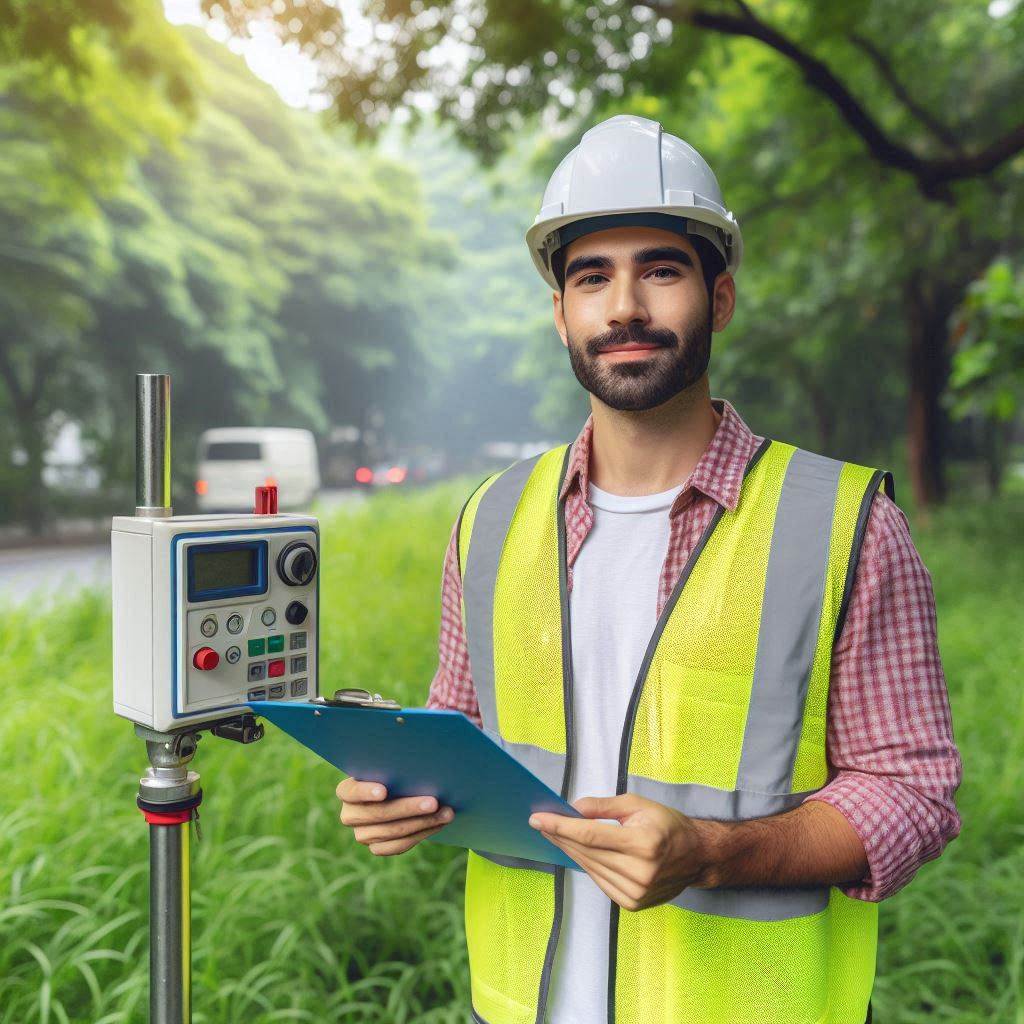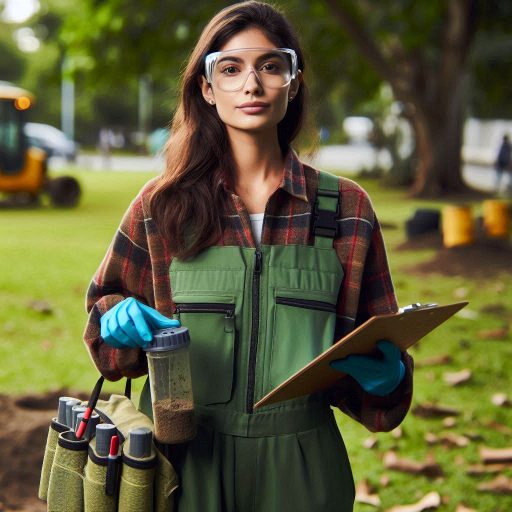Introduction
Continuing education is vital for environmental technicians to remain effective and competitive in their field.
As environmental science rapidly evolves, staying updated is not just an option‘it‘s essential.
Environmental technicians must continuously adapt to new regulations, technologies, and methodologies.
This ensures they can effectively address emerging environmental challenges.
The dynamic nature of environmental science demands that professionals stay informed on current trends and innovations.
Key reasons for continuing education:
- Stay compliant: Regulations frequently change, and staying educated ensures compliance with the latest standards.
- Enhance skills: Advanced training equips technicians with cutting-edge tools and techniques.
- Boost career prospects: Ongoing education opens doors to higher positions and specialized roles.
- Improve job performance: Updated knowledge leads to more efficient and effective work practices.
Basically, embracing lifelong learning is crucial for success in the ever-changing environmental sector.
Importance of Continuing Education
Continuing education is essential for environmental technicians to stay relevant in their field.
The environment constantly changes due to new technologies, regulations, and research findings.
Ongoing education helps technicians stay informed about the latest industry standards and best practices.
It also keeps them updated on emerging environmental issues and solutions.
Reasons for Continuing Education
- Adapt to Industry Changes: New environmental laws and regulations often impact how technicians perform their duties.
- Stay Current with Technology: Technicians must understand new tools and technologies that make environmental monitoring more efficient.
- Enhance Problem-Solving Skills: Learning new techniques and methods allows technicians to address complex environmental challenges effectively.
Benefits of Acquiring New Skills and Knowledge:
Continuing education enables technicians to expand their skill set, which can lead to career advancement.
Acquiring new certifications or specialized training opens doors to higher-level positions.
It demonstrates commitment and expertise, making technicians more valuable to employers.
These skills can also make them eligible for leadership roles, project management, or specialized tasks within their organization.
Career Advancement and Job Satisfaction
- Higher Job Satisfaction: Gaining new knowledge can make the job more fulfilling and engaging.
- Improved Job Opportunities: Technicians with up-to-date skills are more competitive in the job market.
- Professional Networking: Continuing education provides opportunities to connect with other professionals in the field.
Investing in continuing education helps environmental technicians remain competitive and advance their careers.
It also increases job satisfaction by making their roles more dynamic and impactful.
Ultimately, ongoing learning equips technicians with the skills to adapt to the industry’s evolving demands and seize better job opportunities.
Unlocking Better Job Opportunities
In a competitive job market, ongoing education can be the difference between stagnation and advancement.
Technicians with current certifications and skills are more likely to be considered for new opportunities.
Employers prefer candidates who show a commitment to professional growth.
This commitment can open doors to more prestigious roles and higher salaries.
Additionally, continuing education can make a technician more adaptable.
If the environmental field shifts due to new regulations or technologies, those with updated skills can transition more smoothly.
This adaptability ensures long-term employability, even in a rapidly changing industry.
Read: Online Courses for Surveying and Mapping Technicians
Transform Your Career Today
Unlock a personalized career strategy that drives real results. Get tailored advice and a roadmap designed just for you.
Start NowTypes Continuing Education Programs
Types of Continuing Education Programs for Environmental Technicians
Environmental technicians need to stay current with industry trends and regulations.
Continuing education ensures they maintain and enhance their skills.
There are several types of programs available for these professionals, including workshops, seminars, online courses, and certifications.
Workshops
Workshops provide hands-on training and practical experience.
These programs focus on specific skills like hazardous material handling, soil sampling, and water testing.
Participants gain practical knowledge directly applicable to their daily tasks.
Workshops are typically short-term, often lasting one to three days, and involve interactive learning sessions.
For example, the National Environmental Health Association (NEHA) offers workshops on environmental health and safety.
These workshops cover a range of topics, including air quality management, water quality assessment, and waste management practices.
By attending these workshops, technicians can gain valuable insights into the latest industry practices.
Seminars
Seminars are another excellent way for environmental technicians to continue their education.
They usually feature expert speakers discussing current issues and trends in environmental science.
Seminars allow professionals to learn from industry leaders and network with peers.
Organizations like the Environmental Protection Agency (EPA) frequently host seminars on environmental compliance, pollution control, and sustainability practices.
These events help technicians stay informed about regulatory changes and best practices in the field.
Online Courses
Online courses offer flexibility and convenience, allowing environmental technicians to learn at their own pace.
These courses cover a wide range of topics, from environmental law to advanced sampling techniques.
Online learning platforms like Coursera, Udemy, and edX provide a variety of courses tailored to environmental professionals.
For example, the American Public University (APU) offers online courses in environmental science and management.
These courses are designed to enhance the skills of technicians in areas like environmental impact assessment, pollution control, and ecosystem management.
Certifications
Certifications are essential for environmental technicians looking to advance their careers.
They validate a technician’s expertise and knowledge in specific areas.
Certifications often require passing an exam and may include continuing education requirements to maintain the credential.
The Board of Certified Safety Professionals (BCSP) offers the Certified Environmental Professional (CEP) designation.
This certification demonstrates a high level of expertise in environmental practices.
Additionally, the Environmental Professionals of Arizona (EPAZ) offers the Environmental Technician Certification (ETC), which focuses on environmental compliance and fieldwork skills.
Reputable Organizations for Continuing Education
Several reputable organizations offer continuing education programs for environmental technicians.
These include the National Environmental Health Association (NEHA), the Environmental Protection Agency (EPA), and the Board of Certified Safety Professionals (BCSP).
These organizations provide workshops, seminars, online courses, and certifications that help technicians stay current in their field.
By engaging in these continuing education programs, environmental technicians can enhance their skills, stay updated with industry trends, and advance their careers.
Read: Surveying and Mapping Technician: Job Satisfaction
Networking Opportunities
The Importance of Networking in Environmental Science
Networking is crucial in the environmental science industry.
It fosters collaboration, opens doors to new opportunities, and enhances professional growth.
For environmental technicians, building a robust network can be the key to staying informed and advancing in the field.
Enhancing Career Opportunities Through Networking
A strong professional network helps environmental technicians discover job opportunities and stay informed about industry trends.
Networking with peers and experts can lead to job referrals, collaborations on projects, and insights into emerging technologies.
These connections can significantly impact your career trajectory.
Staying Informed on Industry Developments
A strong professional network helps environmental technicians discover job opportunities and stay informed about industry trends.
Networking with peers and experts can lead to job referrals, collaborations on projects, and insights into emerging technologies.
These connections can significantly impact your career trajectory.
The Role of Continuing Education in Networking
Continuing education programs offer more than just knowledge; they provide networking opportunities.
These programs bring together professionals from various backgrounds, creating a space for meaningful interactions and connections.
Attending workshops, seminars, and conferences as part of your continuing education exposes you to new ideas and perspectives.
Building Relationships in Continuing Education Programs
Continuing education programs encourage collaboration among participants.
Working on group projects, participating in discussions, and engaging in practical exercises help you form connections with other environmental technicians and experts.
These relationships can evolve into long-term professional partnerships.
Leveraging Social Media and Online Platforms
Continuing education often integrates online platforms for discussion and collaboration.
These platforms allow you to network with professionals worldwide.
Participating in online forums, joining industry-specific groups, and sharing knowledge can enhance your visibility and credibility in the field.
Accessing Mentorship and Guidance
Networking through continuing education programs can lead to mentorship opportunities.
Connecting with experienced professionals can provide valuable guidance, helping you navigate career challenges and make informed decisions.
Mentors can also introduce you to their networks, further expanding your professional circle.
Expanding Your Professional Reach
Continuing education programs often include guest lectures and presentations by industry leaders.
Engaging with these experts can expand your network and open doors to new opportunities.
These interactions can lead to invitations to conferences, research collaborations, or even job offers.
Read: Importance of Accuracy in Surveying and Mapping

Technology and Tools
Embracing Technology in Environmental Science
Technology is transforming environmental science.
New tools and software enable professionals to gather data more efficiently, analyze results with precision, and implement solutions with greater accuracy.
Environmental technicians must stay updated on these technological advancements to remain effective in their roles.
The Importance of Staying Updated
Staying current with the latest technology is not just beneficial; it‘s essential.
Advanced tools and software can dramatically enhance the efficiency and accuracy of environmental assessments.
For example, Geographic Information Systems (GIS) allow for sophisticated mapping and analysis of environmental data, while remote sensing technologies provide valuable insights from satellite imagery.
Without knowledge of these tools, technicians risk falling behind in their field.
Leveraging Continuing Education Programs
Continuing education programs offer an excellent avenue for environmental technicians to stay informed about the latest technological developments.
These programs often include courses and certifications in cutting-edge software and tools, ensuring that professionals can apply the latest advancements in their daily work.
Regularly participating in these programs keeps technicians at the forefront of their industry.
Online Courses and Webinars
Online courses and webinars are convenient ways for environmental technicians to learn new technologies.
These resources are often self-paced, allowing professionals to balance their education with work commitments.
Webinars, in particular, are valuable for staying updated on the latest industry trends and tools.
Many organizations and institutions offer free or low-cost webinars covering a wide range of technological topics relevant to environmental science.
Transform Your Career Today
Unlock a personalized career strategy that drives real results. Get tailored advice and a roadmap designed just for you.
Start NowIndustry Conferences and Workshops
Attending industry conferences and workshops is another effective strategy for staying updated.
These events provide hands-on experience with new tools and offer networking opportunities with other professionals.
Workshops, in particular, allow technicians to gain practical experience under the guidance of experts.
Conferences often feature presentations on the latest technological advancements, giving attendees insights into emerging trends.
Joining Professional Associations
Membership in professional associations offers another way to stay updated on technology.
Many associations offer members access to exclusive resources, including journals, newsletters, and training opportunities.
These resources often highlight the latest tools and software in environmental science.
Additionally, associations frequently host conferences, workshops, and webinars that focus on technological advancements.
Continuous Learning is Key
Incorporating technology into environmental work is not a one-time task.
It requires continuous learning and adaptation.
Environmental technicians should prioritize ongoing education to remain proficient with new tools and software.
By staying updated, they can ensure their skills remain relevant and effective in an ever-evolving field.
Read: Top Surveying and Mapping Technician Employers
Regulatory Updates
Environmental regulations and policies are not static; they are constantly evolving.
Governments and organizations frequently update them to address emerging environmental challenges.
As new scientific research unveils the impacts of human activities on the environment, these policies must adapt.
Regulatory changes often reflect advancements in technology, shifts in public priorities, or global environmental agreements.
Environmental technicians must be aware of these shifts to ensure their practices remain compliant.
The Impact of Changing Regulations on Environmental Practices
The continuous updates in environmental regulations can significantly affect the day-to-day tasks of an environmental technician.
What was compliant a few years ago may no longer meet the current standards.
For example, waste disposal practices that were once accepted might now be prohibited due to stricter regulations.
Failure to adhere to these updated guidelines can result in fines, legal actions, or harm to the environment.
Environmental technicians must stay informed about these changes to implement the best practices in their field.
The Role of Continuing Education in Navigating Regulatory Changes
Continuing education plays a critical role in helping environmental technicians stay ahead of regulatory changes.
Through these programs, technicians can learn about the latest updates in environmental policies and regulations.
Many continuing education programs focus on the specific impacts of new regulations on environmental practices.
These programs often provide case studies and practical examples, helping technicians apply the new knowledge directly to their work.
By participating in these programs, technicians can ensure their practices remain compliant and environmentally responsible.
Ensuring Compliance Through Ongoing Learning
To stay compliant, environmental technicians need more than just awareness; they need a deep understanding of the new regulations.
Continuing education provides the necessary tools and knowledge to interpret and implement these changes effectively.
Regularly updated courses can help technicians develop strategies to adjust their practices according to the latest regulations.
This ongoing learning process helps prevent costly mistakes and ensures that the technician‘s work supports environmental sustainability.
Best Practices in Staying Informed
Environmental technicians should not rely solely on mandatory training sessions to stay informed.
Proactively seeking out continuing education opportunities is essential.
Technicians should subscribe to industry newsletters, attend workshops, and participate in online forums.
Engaging with professional organizations can also provide access to the latest regulatory updates and educational resources.
By actively seeking out this information, environmental technicians can stay ahead of changes and continue to perform their duties at the highest standard.
Read: CAD Technician Salary: What to Expect in the USA
Time Management and Study Tips
Balancing work responsibilities with continuing education can be challenging for environmental technicians.
However, it is achievable with the right strategies.
Here are some practical tips to help you manage both effectively.
Prioritize and Plan Your Time
Effective time management is crucial.
Start by identifying your most critical work tasks and educational goals.
Prioritize these tasks and allocate specific time blocks for them.
Break down your study sessions into manageable chunks.
For instance, dedicate 30 minutes each day to reviewing course materials.
Create a detailed weekly schedule that includes work, study time, and personal activities.
This helps you stay organized and ensures you don’t neglect any responsibilities.
Use digital tools like Google Calendar or time management apps to keep track of your schedule.
Maximize Your Downtime
Use your downtime wisely.
During breaks at work or commuting, review notes, watch educational videos, or listen to relevant podcasts.
This approach helps reinforce learning without requiring additional time outside work hours.
It also keeps you engaged with your studies and reinforces key concepts regularly.
Leverage Online Learning Resources
Online courses offer flexibility, allowing you to study at your own pace.
Choose programs that fit your schedule and learning style.
Many institutions offer courses specifically designed for working professionals, with evening or weekend classes.
Take advantage of online forums and study groups.
These platforms allow you to connect with peers and share insights.
Engaging with others in your field can deepen your understanding of complex topics and provide additional support.
Set Realistic Goals
Set achievable goals for both your work and education.
Avoid overloading yourself with too many courses or projects.
Instead, focus on mastering one or two subjects at a time.
This approach reduces stress and enhances the quality of your learning.
Break down your goals into smaller, measurable tasks.
For example, aim to complete one chapter or module per week.
Celebrate small victories to maintain motivation and momentum.
Seek Support from Employers
Communicate your educational goals with your employer.
Many companies support continuing education by offering flexible work schedules or financial assistance.
Discussing your ambitions may lead to opportunities for professional growth within your organization.
Inquire about educational leave or reduced hours during exam periods.
Some employers may also offer in-house training programs that align with your career objectives.
Practice Self-Care
Balancing work and education can be demanding, so prioritize self-care.
Ensure you get enough sleep, eat well, and exercise regularly.
A healthy mind and body improve focus, productivity, and retention of new information.
Incorporate relaxation techniques, such as meditation or deep breathing exercises, to manage stress.
This helps you stay calm and composed, even during busy periods.
By following these strategies, environmental technicians can successfully balance their work responsibilities with continuing education, ultimately advancing their careers and expertise.
Learn More: Top Telecommunications Technician Certifications to Pursue
See Related Content: Certifications for Aspiring Environmental Technicians
Uncover the Details: Nuclear Engineering: Pros and Cons of the Profession
Transform Your Career Today
Unlock a personalized career strategy that drives real results. Get tailored advice and a roadmap designed just for you.
Start NowProfessional Development Opportunities
Continuing education plays a crucial role in the professional development of environmental technicians.
It keeps them updated on the latest industry standards and technologies.
Engaging in ongoing education enhances their problem-solving skills and boosts their confidence in the field.
A. How Continuing Education Contributes to Professional Development
- Broadens Knowledge Base: Continuing education exposes technicians to new concepts, tools, and methodologies.
This knowledge keeps them competitive and relevant in the job market. - Enhances Career Advancement: Completing advanced courses can open doors to promotions or specialized roles.
Employers often seek technicians with up-to-date qualifications. - Increases Job Security: Technicians who stay informed about regulatory changes and industry trends are valuable assets.
Their skills help organizations adapt to evolving environmental policies. - Builds a Professional Network: Attending workshops and seminars fosters connections with peers and industry leaders.
These relationships can lead to mentorship and career opportunities.
B. Skills and Knowledge Gained Through Ongoing Education Programs
Technical Skills
- Data Analysis: Learn advanced data collection and interpretation techniques. This helps in producing accurate environmental assessments and reports.
- Equipment Handling: Master the use of sophisticated monitoring equipment. This ensures efficient, precise fieldwork and lab testing.
Regulatory Compliance
- Legal Knowledge: Gain a deep understanding of local, national, and international environmental laws. This minimizes compliance risks for employers.
- Permitting Processes: Learn about the procedures for obtaining necessary environmental permits. This speeds up project timelines.
Soft Skills
- Communication Skills: Develop clear and concise reporting skills. Effective communication helps in explaining complex data to non-experts.
- Team Collaboration: Learn effective teamwork strategies. These skills improve project coordination and overall productivity.
Specialized Expertise
- Environmental Impact Assessment: Gain expertise in evaluating environmental impacts of proposed projects. This knowledge is crucial for sustainable development.
- Pollution Control: Learn advanced pollution control methods. This expertise helps reduce environmental damage.
Continuing education empowers environmental technicians by enhancing their skills, knowledge, and professional growth.
By staying informed and engaged, they become key players in promoting sustainable practices.
Conclusion
Continuing education is essential for environmental technicians to advance their careers and stay competitive.
This blog post emphasized the importance of ongoing learning in a rapidly changing industry.
Technicians must stay updated on regulations, emerging technologies, and best practices to excel.
Continuous education ensures technicians maintain their certifications and meet industry standards.
We explored various continuing education options, including online courses, workshops, and industry conferences.
These opportunities offer flexible learning paths that can fit any schedule.
Engaging in professional development also enhances problem-solving skills and improves job performance.
Technicians who actively pursue education often find themselves better equipped to handle complex environmental challenges.
Networking opportunities, another key benefit of continuing education, connect technicians with industry leaders and peers.
Building these connections can lead to new job opportunities and collaborations.
Staying informed about the latest industry trends also positions technicians as valuable assets to their employers.
Investing in education is an investment in your future.
It opens doors to promotions, salary increases, and greater job satisfaction.
As the environmental field continues to evolve, technicians who commit to lifelong learning will stand out.




